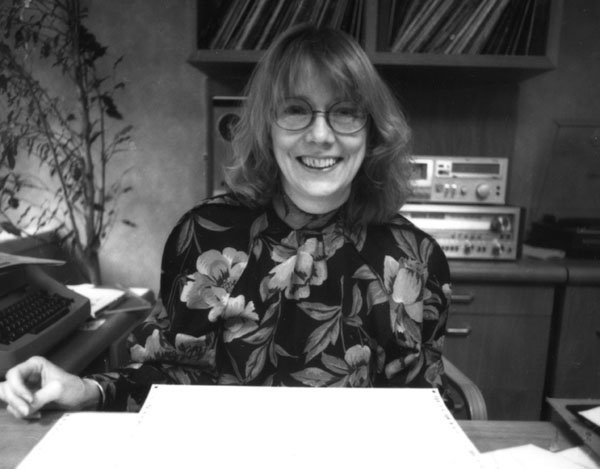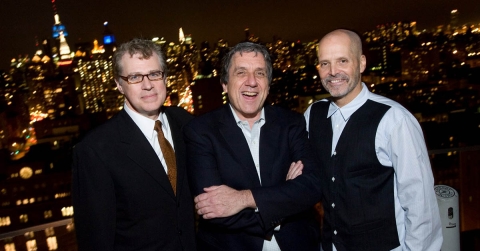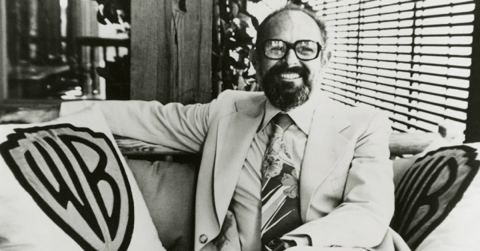Karin Berg, a friend and colleague for many years, died on October 25 at the age of 70 after a long illness. A memorial service was recently held at St. Marks Church in Manhattan where friends and artists with whom Karin worked gathered to remember her. Here, Nonesuch Executive Vice-President David Bither offers his own remembrance.
By David Bither
Karin Berg, a friend and colleague for many years, died on October 25 at the age of 70 after a long illness. A memorial service was recently held at St. Marks Church on the Lower East Side of Manhattan where friends and artists with whom Karin worked gathered to remember her. Photographs from the gathering can be seen at stilltv.com.
Karin was an A&R person for Elektra and then Warner Bros. Records, where she ran the department on the East Coast. In the last years of her life, she was a consultant to us at Nonesuch. A&R is an old fashioned record business term that stands for “artist and repertoire"; it comes from the Tin Pan Alley era, when one of the primary tasks of a record company was to pair an artist with the right songs in order to produce a hit. Later, in the post-Dylan era, most singers wrote their own songs, and the term A&R came to describe talent scouts out scouring clubs and shops for the next big thing.
Karin was a woman in a business dominated by men, the first A&R woman to rise as far as she did. She was responsible for—either signing or working closely with—an extraordinary roster of musical artists of the punk and post-punk era: Television and its leader Tom Verlaine, the B-52s, Dire Straits, the Roches, Tin Huey, Marshall Crenshaw, Laurie Anderson, the Cars, Hüsker Dü, and REM among them.
There is a great deal of talk today about the perilous state of the record business, threatened by downloading, grasping at iStraws, an increasingly desperate commercial enterprise plying ringtones and digital wallpaper with little room for artists of real substance to find refuge. But the truth is that it has always been a business intent on finding the next hit and usually looking in the direction from which the last one came.
Karin was different. She was fierce about the artists she loved and in that way she represented an independent, contrarian tradition that produced the best of the music we all still revere. Karin had no illusions about the business she was in and would be the first to tell a young artist to stay away, that the indie route was the best for them, if she felt they were either unable or unwilling to succeed in a more commercial venue. But as is evident from the artists Karin worked with, she did not often make obvious choices, and she then created a supportive environment that earned her those artists' undying love—and just as important, the respect of her co-workers. This respect often resulted in a dedication to the artists that Karin represented and, sometimes against long odds, their success.
She suffered from myositis for a decade, a progressively debilitating disease with no known cure. It affected her respiratory system, forcing her to carry an oxygen tank wherever she went, and over the years, it increasingly limited her mobility. At first she would come to the Nonesuch office at least once a week to listen to musical submissions, share her enthusiasm for new artists she had heard, and dispense her opinion to those of us who were wise enough to ask for it.
Karin loved music—jazz even before she witnessed the Village folk scene in the early 1960s and then the decades of rock and soul and punk and hip-hop. She loved the New York Mets. She was a political activist from beginning to end: her friends remember her insisting they journey uptown to Columbia University to hear the little-known minister Martin Luther King Jr. speak in the late '50s; they remember seeing her picketing restaurants that would not serve African Americans, seeing her on television—all five feet of her—at one demonstration or another waving a finger at a policeman and telling him to back off.
I knew her later in her life, after the days at Elektra and Warners, after the disease struck that nearly killed her and then left her to cope with its impact for a decade.
But I remember her best the night we went to see Bright Eyes play Town Hall—it was hard for her to get out, but she had heard enough about young Conor Oberst to know that she needed to see him. And after the concert, her eyes shining, she struggled up two flights of stairs, oxygen tank in hand, fought to catch her breath for a minute, and another, before telling Conor how much she loved what he did.
When in October we hired Slim Moon, the founder of the Kill Rock Stars label, to come to Nonesuch, Karin wrote me for the last time. She wanted me to know how thrilled she was at the news, that she knew Slim and thought he was wonderful and, in her instructive manner, that this would be a good thing for Slim and for Nonesuch. She approved. Slim later told me that in those early days at Kill Rock Stars, he sent her a postcard from Italy telling her that she was his “hero.”
He was not alone in his opinion.
David Bither is Executive Vice-President of Nonesuch Records.
A Karin Berg Fund has been established at The Hospital for Special Surgery to benefit the Myositis Support Group. Checks can be made out to The Hospital for Special Surgery, with Karin Berg fund in the memo line, and sent to Karen Wilson, Development Office, Hospital for Special Surgery, 535 E. 70th Street, NY, NY 10021.



